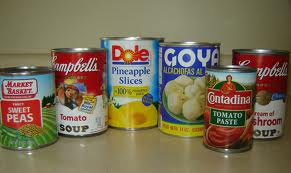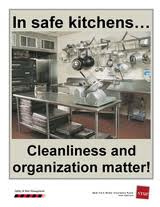It is vital to keep the food we eat safe from contamination. Never take food safety for granted ,in fact, food should enhance our health and life instead of causing health problems, that is why we must play a part in the food safety chain from the time it is bought to the time it is eaten. A lot of day today care should is needed where food is concerned. I am giving below a list of do’s and dont’s where food safety is concerned – A to Z guide!
A is for Additives
We have to get into the practice of reading the labels on food stuff so that you know what you are getting. For example :- Ajinamoto , which is a texturing agent is not just confined to Chinese food alone. You find it as mono-sodium glutamate ( MSG) in packaged soups, canned foods, salted snacks, like potato chips and such other stuff. Besides causing allergy, nausea and headache in some of us, this stuff is harmful for children, pregnant women and nursing mothers.
Then there are sweeteners . Watch out for processed foods containing hidden sugars and honey if you are a diabetic. Aspartame, an artificial sweetener is not recommended for pregnant women and nursing mothers and for those suffering from diseases linked to the bowel and kidney ! Caffeine found in colas is also not recommended for pregnant women and some other drinks contain the drug quinine which can cause abdominal pain, vomiting and blurred vision.
In fact every packaged food has something that is harmful for our body and unless we study the label we never know what we are consuming. Instead of giving up altogether , make sure that you consume in smaller quantities and also have more natural food like fruits and vegetables that offset the harmful effects of additives !
B is for Bacteria
There are plenty of them around us , so beware ! There are baddies like Salmonella, listeria campylobactor which can cause food poisoning, acute gastroenteritis. These and other germs cannot be seen and they tend to spread before you can so much as pronounce their names and double every twenty minutes in warm weather. One bacterium can multiply into one million within seven hours.
We have heard of life threatening form of food poisoning called Batulism which kills roughly two thirds of the victims who get afflicted ! Nausea and vomiting begins 12 – 36 hours after eating a toxin containing food. Specially suspicious are food items like homemade preserved foods like pickles, jams, salt fish , homemade cheese.
Some of the symptoms that follow are blurred vision, unsteadiness, difficulty in chewing and swallowing or even speaking and breathing. The patient should be immediately hospitalised since any delay can be fatal. Some of the acute diseases that spread through bacteria are typhoid, Dysentry, Cholera.

C is for Canned Food
This is becoming more and more prominent in our kitchens these days since they are convenient and one can rustle up a quick meal with the help of tinned food items. However we need to take special care while buying and storing tinned food.
Wipe clean or wash the tops of the cans before opening, so that there is no contamination of any sort. Don’t leave food in open cans, transfer the left over food into a covered container and keep it in the refrigerator and use it within 2 days. Dispose of the empty cans immediately and clean the can opener each time you use it to open something.
D is for Drains
Keeping drains clean and odor free is very essential. This can be done by running very hot water through the mouth every now and then. Try to avoid getting vegetable matter or grease in a kitchen drain. I make it a point to use a finer mesh on top of the drain opening which filters all solid material which can be collected and disposed off.
A large spoonful of baking soda can be added once a week and pour a large jug of very hot water over it. Alternatively adding a cupful of vinegar too helps in keeping the drain clean and free of clutter. A couple of naphthalene balls in the mesh can prevent the cockroaches from invading your kitchen. Pouring hot water into the drain every now and then helps it keep clean.
E is for Eggs
Although majority of the eggs are sterile , there are chances that the shells become contaminated by the fecal matter from the hens which tend to stick to the eggs . This can penetrate through the shell. So make sure that you wash the eggs thoroughly before refrigerating them and buy those that are clean on the outside. It is advisable to store eggs in the fridge ( on the shelf, on the door in the container provided ). Try to eat them quickly within 3-4 days .
Many doctors advise not to eat raw eggs because f the bacteria that could be present. In fact pregnant women, small children, old people and sick and ailing people are advised not to consume raw eggs. One has to make sure that both the white and yolk are cooked to at least semi solid levels before consuming. It is in our interest to wash our hands thoroughly before and after handling eggs.
F is for Fridges and Freezers
One cannot think of life these days without having a fridge at home, it has become one of the bare essentials of life! Fridges and freezers should be kept absolutely clean all the time, at the correct temperature and defrosted regularly. Cooked food should be stored separately in covered containers or properly wrapped. Give enough space between items so that they can breath and keep cold and healthy !
We have to remember that freezing does not kill bacteria, whereas cooking does. So while storing cooked food make sure that it is still fresh and not on the verge of decaying, which means the entire lot of other food kept in the fridge is going to get contaminated to a certain extent. Thawing speeds up the enzyme reaction and encourages rapid deterioration , so it is better to first transfer food items kept in the freezer to the fridge and then microwave it so that it thaws faster.
Remove spills immediately so that it does not spread odor inside the fridge and help food items decay. Every now and then give a thorough cleaning by washing the shelves and the interiors of your fridge using a solution of baking soda mixed with hot water and then wiped dry with a dry cloth.
Draining trays should be checked regularly for any water collected in them. If left for a long time they tend to become a cozy place for mosquitoes to breed and cockroaches to infest and multiply !
G is for grease
Grease is a menace in the kitchen, but cannot be avoided since our food tends to have some amount of oil, butter or ghee in it. We fry, grill and stir fry and all this requires oil which tends to stick to the oven, stove and even on the kitchen tiles .The golden rule in keeping an oven clean is to wipe the stains as and when they occur and wash the surface regularly if possible every day. Kitchen work top should be cleaned everyday at the end of the day, so that it gets to dry and be fresh the next morning when you start your day. Kitchen tiles should be regularly cleaned since food splashes onto them and leaves stain marks.
To clean burnt out grease from a stove or an oven, pour one cup of ammonia in a glass bowl and leave overnight in the cool oven. Next morning dilute it with water and wash the surface. This removes almost any kind of grease mark and dirt. Scrub the tough stains with a scrubber . Cleaning a microwave oven is relatively easier . You can clean it with a damp paper towel and finish off with a mild solution of soap and finally a dry towel.
Chimneys too need to be cleaned regularly since they too tend to collect grease spots with time and so do exhaust fans , which may be cleaned at least 2 or 3 times a year by dismantling the fan and dipping it in warm soapy solution and cleaning and wiping thoroughly with a cloth before fixing it back again.

H is for Hands
I see many ladies don't bother to wash their hands while handling different food items, like for example they dip their hands in the salt container without washing their hands after cutting onions and so on...We have to remember that our hands spread germs and need to be kept clean. Wash the in warm soapy water as frequently as possible. Before you start cooking make sure that you keep your bangles and rings out of reach especially if you are in the habit of wearing junk jewellery which may run color or the material used gets withered or burnt in the heat.
Make sure that you wash your hands thoroughly
a, after you use the toilet b, before handling food c, Before changing babies nappies d, blowing your nose e, combing your hair f, touching raw food g, touching pets h, after handling kitchen waste !
Keep your hands dry by wiping them on a clean towel or a disposable tissue !
I is for Instructions
Make sure that you obey them faithfully for your own good !This includes labels and every other thing that concerns your kitchen.
1,Check use by and best before on food and drink labels.
2, Follow storage, cooking and preparation instructions.
3, If safety seals have been broken before you open a package, return the package.
4,Take note of special instructions for microwavable foods.
5, Look after your appliances folowing the instructions given in the mannual. Make sure that you keep all the mannuals safely in one place which can easily be reached .
J is for Jewellery
Germs love to nestle in the most unlikely places ! They love to nestle in jewelry , within the intricate patterns of bangles and bracelets and wherever else there is scope for them to settle and multiply uninhibited.
So make sure to take off your ornate rings and bracelets before you start cooking , that come in the way while handling food. This is also a good practice since gems do get tarnished if they come into contact with Tamarind water, turmeric powder or other spice powders that are used in our daily cooking . There is always a chance that the precious stones might come loose and fall into the food without your knowledge. I have known several such cases where there was a near accident that was fortunately avoided at the last minute .So, to avoid such happenings it is better to take precaution and avoid wearing any ornaments while cooking.

K for Kitchen
Keep your kitchen neat and tidy and immaculate. Wash all surfaces, utensils, appliances, chopping boards and dish clothes thoroughly after every use or at least at the end of the day. It is very essential to keep them squeaky clean because this is one of the easiest ways for germs to breed and spread to other stuff inside the kitchen.
1, Make sure that you store raw and cooked food separately
2, Don’t leave any food particles in the wash basin or sink.
3, Don’t leave unwashed dishes overnight and if you must, then rinse them in water so that there are no food particles sticking to them.
4, Sponges and dish clothes should be wrung out after use and left to dry, otherwise they tend to attract cockroaches and other insects.
5, Line your cupboards with newspapers or other material so that any spillage can be easily cleaned by changing the paper regularly.
6, Use a Plastic chopping board instead of a wooden one because it wont warp and can be scrubbed with soap and hot water. If and when it becomes stained after constant use, apply the board with household bleach, leave it on for a few minutes and wash thoroughly with warm soapy water.
L is for Leftovers
A golden rule that needs to be followed in the kitchen is never to leave any leftover food on the counter top or lying around on the shelves or table. Don’t leave leftovers out in the open, instead keep it covered and in your refrigerator.
Keep cold foods back in the fridge at once. We may take out a small portion to use for a meal and once that is done the leftover food should be immediately put back into the fridge. Make sure that the hot food completely cools down to room temperature before putting it into the refrigerator. Make sure to store them above raw foods. Also, make sure that leftovers are consumed as quickly as possible. Never mix old food with fresh newly cooked one since the degradation process gets hastened and you may find spoilt food on your hands within a few hours.
Ideally we should cook just sufficient food to last through the day or for the next day when we are pressed for time. So , make it a practice not to have many leftovers at the end of the day to avoid food contamination.Cooked food gets degradede pretty fast in tropical weather like in India, and food once spoilt can cause havoc with our system and our family's health!
(I will continue the rest in my second article on the same subject )